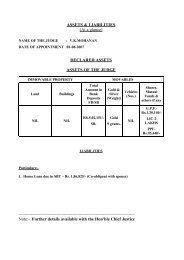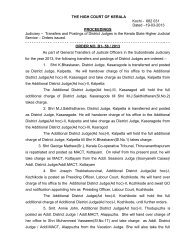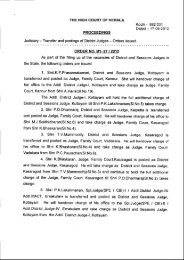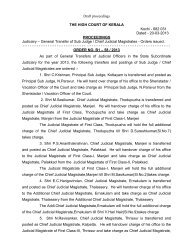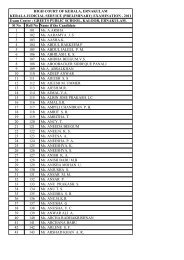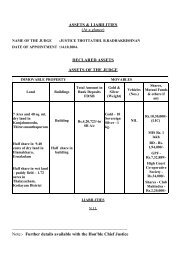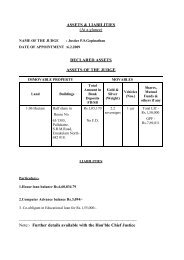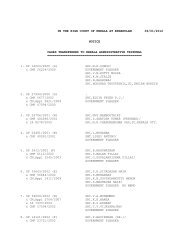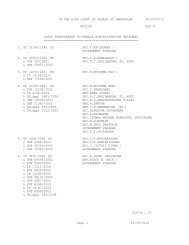INDIAN LAW REPORTS - Kerala High Court
INDIAN LAW REPORTS - Kerala High Court
INDIAN LAW REPORTS - Kerala High Court
You also want an ePaper? Increase the reach of your titles
YUMPU automatically turns print PDFs into web optimized ePapers that Google loves.
George, M. I. v. <strong>High</strong> <strong>Court</strong> of <strong>Kerala</strong> I.L.R. 2010 (2) <strong>Kerala</strong> .. 213<br />
Constitution of India—Article 77—If the Government is authorised to do<br />
something by framing rules or by issuing notification, it can do the<br />
same thing by issuing executive order.<br />
George, M. I. v. <strong>High</strong> <strong>Court</strong> of <strong>Kerala</strong> I.L.R. 2010 (2) <strong>Kerala</strong> .. 213<br />
Constitution of India—Article 226—Scope of Judicial Review of award of<br />
Labour <strong>Court</strong>—Choice of penalty is always subjective, about which<br />
two persons can take diametrically different views on the same set of<br />
facts—As long as the decision to award penalty is not perverse or<br />
arbitrary, <strong>High</strong> <strong>Court</strong> is not justified in interfering with penalty meted<br />
out by Labour <strong>Court</strong> as if it is exercising appellate power under Article<br />
226—Industrial Disputes Act, 1947 (Central Act 14 of 1947)—Section<br />
11 A.<br />
General Secretary v. Deputy General Manager I.L.R. 2010 (2) <strong>Kerala</strong> .. 328<br />
Constitution of India—Article 226—Police protection for construction of<br />
mobile towers—There is a statutory duty cast upon the police under<br />
Section 29(b)(d)(h) and (r) of the <strong>Kerala</strong> Police Act and under Section<br />
149 of the Code of Criminal Procedure, to prevent any cognisable<br />
offence and to meet the threat to law and order—When construction of<br />
mobile towers and their energisation is being obstructed by a group of<br />
people based on their apprehension and without any legal right, the<br />
police cannot act as silent spectators—If the police fail in discharging<br />
their statutory duty, the same is liable to be corrected by issuing<br />
appropriate writ for police protection, so as to maintain rule of law.<br />
Reliance Telecommunications Ltd. v. S.I. of Police (F.B.)<br />
I.L.R. 2010(2) <strong>Kerala</strong> .. 592<br />
Constitution of India—Article 226—Police Protection—The alternate remedy<br />
available under Order XXXIX, Rule 2A of the Code of Criminal<br />
Procedure may not be effective when a group of people, whose identity<br />
is not known, causes obstruction—Subject-matter of a case before the<br />
Civil <strong>Court</strong> and granting of injunction can only be in respect o/ a<br />
known person—Code of Civil Procedure, 1908 (Central Act 5 of 1908)-<br />
Order XXXIX.<br />
Reliance Telecommunications Ltd. v. S.I. of Police (F.B.)<br />
I.L.R. 2010 (2) <strong>Kerala</strong> .. 592<br />
Constitution of India—Article 226—Police Protection—Availability of<br />
alternate remedy is not a bar to invoke the writ jurisdiction,<br />
particularly in matters of police protection—For refusing to invoke<br />
jurisdiction, the alternate remedy available should be equally<br />
convenient and effective as well.<br />
Reliance Telecommunications Ltd. v. S.I. of Police (F.B.)<br />
I.L.R. 2010 (2) <strong>Kerala</strong> .. 592



